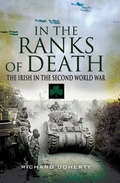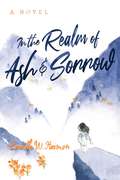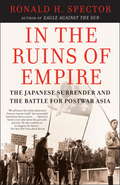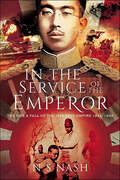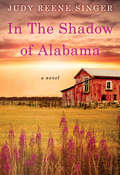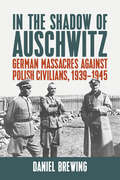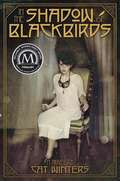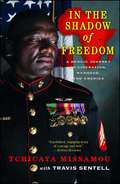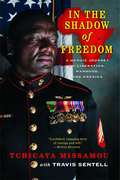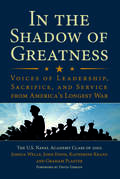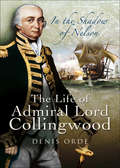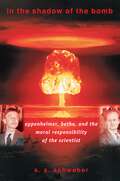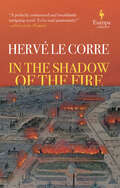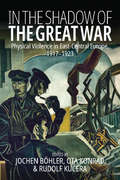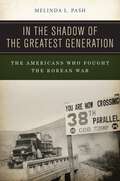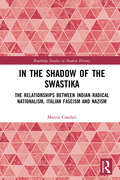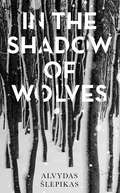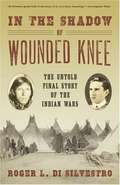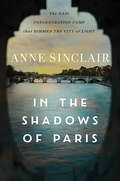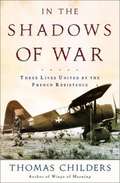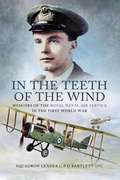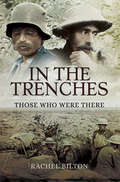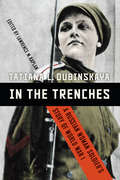- Table View
- List View
In the Ranks of Death: The Irish in the Second World War
by Richard DohertyWhen war broke out in 1939 over 20,000 Irishmen were serving in the Royal Navy, Army and Royal Air Force with the greatest proportion in the Army. During the war this rose to over 120,000, suggesting that about 100,000 enlisted during the war. Nine earned the Victoria Cross; three members of the Royal Navy, including a Fleet Air Arm pilot, four soldiers, including a member of the Australian forces, and two RAF pilots.The author looks at the seven Irish regiments in campaigns across the globe, at Irish soldiers across the Army, at Irish sailors from the Battle of the River Plate to the final actions against Japan, and at Irish airmen from the first bombing raids of the war to the closing days of war. Included are outstanding personalities such as the Chavasse brothers, who earned three DSOs, three DSCs and two MiDs, Bala Bredin, Corran Purden, Brendan 'Paddy' Finucane, Blair Mayne and Roy Farran, the latter pair highly-decorated SAS officers. There are also Irish generals, such as Paddy Warren who died while commanding 5th Indian Division in Burma and Frederick Loftus Tottenham, who commanded 81st (West African) Division, not to mention giants such as Alexander, Auchinleck, Montgomery and McCreery. Irish women are not forgotten in the book which also takes a brief look at the Irish in other Allied forces, including a most unusual volunteer for the US Navy whose application to serve had to be approved by President Roosevelt. He was William Patrick Hitler, a nephew of Germany's fhrer.
In the Realm of Ash and Sorrow
by Kenneth W. HarmonWhen the spirit of an American airman befriends a Japanese woman and her daughter in the days before the Hiroshima bomb, he races against time to save the ones he loves the most.When American WWII bombardier Micah Lund dies on a mission over Japan, his spirit remains trapped as a yurei ghost. Dazed, he follows Kiyomi Oshiro, a war widow struggling to care for her young daughter, Ai, as food is scarce, work at the factory is brutal, and her in-laws treat her like a servant. Watching Kiyomi and Ai together, Micah&’s intolerance for the enemy is challenged. As his concern for the mother and daughter grows, so does his guilt for his part in their suffering.Micah discovers a new reality when Kiyomi and Ai dream—one which allows him to interact with them. While his feelings for them deepen, imminent destruction looms. Hiroshima is about to be bombed, and Micah must warn Kiyomi and her daughter.In a place where dreams are real, Micah races against time to save Kiyomi and Ai, while battling the old beliefs he embodied as a soldier and his idea of family.In the Realm of Ash and Sorrow is a tale about love in its most extraordinary forms—forgiveness, sacrifice, and perseverance against impossible odds.
In the Ruins of Empire
by Ronald H. SpectorWhile he is perhaps overly optimistic in suggesting that the American experience in Iraq has made it "unnecessary to explain that military occupations that follow on the complete disruption of a country's old order are often ill-conceived, confused, messy affairs that can result in unforeseen consequences for both the occupied and the occupiers," Spector (history and international relations, George Washington U. ) has perhaps made that lesson clearer with his historical examination of British, Chinese, US, and Soviet occupations of vast areas of mainland Asia following the collapse of the Japanese empire in World War II, which recounts great power rivalries, shifting political and military alliances, and social and political upheaval across post-1945 Asia. Annotation ©2007 Book News, Inc. , Portland, OR (booknews. com)
In the Service of the Emperor: The Rise and Fall of the Japanese Empire, 1931–1945
by N.S. NashThe expansion of the Japanese Empire between 1931 until its defeat in 1945 is one of the most extraordinary yet shocking episodes in human history. Extraordinary in that a relatively non-industrialised island nation was prepared to go to war, concurrently, with China, the most populous country, Great Britain with its world-wide empire and the USA, the wealthiest and most powerful country on earth. Shocking, as those 'in the service of the Emperor’ practiced persistent and unrestrained brutality as they conquered and occupied swathes of South East Asia. But, as this superbly researched work reveals, there is no denying their fighting and logistical expertise. The author examines the political, economic and strategic effects of the rapid Japanese expansion and explores the cult of deity that surrounded the Emperor. The contribution of the Allied forces and their leadership is given due attention. When retribution duly came, it was focussed on the military leadership responsible for unspeakable atrocities on their military and civilian victims. The physical perpetrators remaining largely unpunished. Japan, today, has still not acknowledged its wartime guilt. The result is an authoritative, balanced and highly readable account of a chapter of world history that must never be forgotten.
In the Shadow of Alabama
by Judy Reene SingerJudy Reene Singer’s newest novel is a masterful story of the American experience. Between the past and present, between love and war, between the burdens of race and hope, a woman returns home to discover her father and a history she had never known...Rachel Fleischer has good reasons not to be at her father’s deathbed. Foaling season is at hand and her horses are becoming restless and difficult. Her critical mother and grasping sister could certainly handle Marty Fleisher’s resistance better without her. But Malachi, her eighty-something horse manager—more father to her than Marty has ever been—convinces Rachel she will regret it if she doesn’t go.When a stranger at her father’s funeral delivers an odd gift and an apology, Rachel finds herself drawn into the epic story of her father’s World War II experience, and the friendships, trauma, scandal, and betrayals that would scar the rest of his life—and cast a shadow across the entire family. As she struggles to make sense of his time as a Jewish sergeant in charge of a platoon of black soldiers in 1940s Alabama, she learns more than just his history. She begins to see how his hopes and disappointments mirror her own—and might finally give her the means to free herself of the past and choose a life waiting in the wings.“Prepare for Singer to keep you up all night ricocheting between a present day horse farm, family traumas, and the unthinkable racism in the military during WWII. The long arm of war travels through generations in this emotional drama.” —New York Times bestselling author Jacqueline Sheehan
In the Shadow of Auschwitz: German Massacres against Polish Civilians, 1939–1945
by Daniel BrewingThe Nazi invasion of Poland was the first step in an unremittingly brutal occupation, one most infamously represented by the network of death camps constructed on Polish soil. The systematic murder of Jews in the camps has understandably been the focus of much historical attention. Less well-remembered today is the fate of millions of non-Jewish Polish civilians, who—when they were not expelled from their homeland or forced into slave labor—were murdered in vast numbers both within and outside of the camps. Drawing on both German and Polish sources, In the Shadow of Auschwitz gives a definitive account of the depredations inflicted upon Polish society, tracing the ruthless implementation of a racial ideology that cast ethnic Poles as an inferior race.
In the Shadow of Blackbirds
by Cat WintersIn San Diego in 1918, as deadly influenza and World War I take their toll, sixteen-year-old Mary Shelley Black watches desperate mourners flock to seances and spirit photographers for comfort and despite her scientific leanings, must consider if ghosts are real when her first love, killed in battle, returns.
In the Shadow of Freedom: A Heroic Journey to Liberation, Manhood, and America
by Tchicaya Missamou Travis SentellFROM POVERTY TO WEALTH, FROM AFRICA TO AMERICA, AND FROM CHILD SOLDIER TO U.S. MARINEBorn into the Congolese wilderness, Tchicaya Missamou became a child soldier at age 11. As a horrific civil war loomed across his country, Tchicaya began using his militia connections to ferry jewels, cash, computers, and white diplomats out of the country. By 17, he was rich. By 18, he was a hunted man, his house destroyed, his family brutalized in front of him by his own militia. By 19, he’d left behind everything he’d ever known, escaping to Europe and, eventually, to America. Incredibly, that was only the start of his journey.In the Shadow of Freedom is the uplifting story of one man’s quest to achieve the American Dream. Tchicaya Missamou’s life is a shining example of why America is a gift that should not be taken for granted, and why we are limited only by the breadth of our imagination and the strength of our will.
In the Shadow of Freedom: A Heroic Journey to Liberation, Manhood, and America
by Tchicaya Missamou Travis SentellFROM POVERTY TO WEALTH, FROM AFRICA TO AMERICA, AND FROM CHILD SOLDIER TO U. S. MARINE Born into the Congolese wilderness, Tchicaya Missamou became a child soldier at age 11. As a horrific civil war loomed across his country, Tchicaya began using his militia connections to ferry jewels, cash, computers, and white diplomats out of the country. By 17, he was rich. By 18, he was a hunted man, his house destroyed, his family brutalized in front of him by his own militia. By 19, he'd left behind everything he'd ever known, escaping to Europe and, eventually, to America. Incredibly, that was only the start of his journey. In the Shadow of Freedom is the uplifting story of one man's quest to achieve the American Dream. Tchicaya Missamou's life is a shining example of why America is a gift that should not be taken for granted, and why we are limited only by the breadth of our imagination and the strength of our will.
In the Shadow of Greatness
by Katherine E. Kranz John Ennis Joshua Welle Graham M. PlasterTheir stories needed to be told. And classmates working together, under a blanket of trust and friendship, was the only way to allow people to open up. It was a three year journey into the hearts and souls of America's youngest heroes to gather these important historical accounts, but it was worth every hour spent. Inside this book are the voices the first Annapolis graduates into a decade of war and they remind us that America is in good hands.They were walking to class on 9/11, wearing Naval Academy "summer working blues", when the towers were struck. The campus went to general quarters, battle stations. They would be the first class after this attack to graduate into a nation at war and would be faced, like so many past graduates, of rising to the challenge to keeping America great. President Bush and Vice President Cheney articulated a world at the crossroads, and the U.S. would preemptively in seek enemies who threatened the national interest, America would not again be terrorized.In the Shadow of Greatness addresses issues that go beyond one USNA class, it explains the trials of most military veterans of this era. Understanding how a young person enlists to serve, deploys to the fight, and returns home is unknown to most Americans. Veterans pack up their uniforms, but never lose the call for service when the return to civilian society.The profiles in this book represent the "Next Great Generation" of American leaders. Men and women who lost their innocence in battle and their youths to a decade of deployments, throughout which they never gave up hope. In exchange for down range scars, they gained an unbreakable sense of purpose to America's ideals-freedom, equality, and democracy.The compilation is the most authentic and raw narrative to emerge from the Wars in Iraq, Afghanistan, and beyond. The reader enjoys a spectrum of stories, each patriotic and honorable. The narratives are meant to inspire, educate, and reveal a world many don't understand. Its contents are readable and easy to appreciate.The Class of 2002-and more broadly, the one million veterans of the Long War-are America's leaders of tomorrow. Read this book to learn what they endured and why they are prepared.
In the Shadow of Nelson: The Life of Admiral Lord Collingwood
by Denis OrdeVice Admiral Cuthbert (Cuddy) Collingwood may have been 10 years older than Horatio Nelson but he was Nelson's close friend from the outset. They served together for over 30 years and only at Trafalgar, was Nelson his superior officer. The relationship is all the stranger as their temperaments greatly differed. Collingwood was reserved, austere and shy but utterly competent which was why Nelson's meteoric career was so closely linked to his. Collingwood's reputation was made in battles such as The Glorious First of June (1794) and Cape St Vincent (1797). Collingwood's career survived reverses; he was court-martialed in 1777 by a commander for whom he had no respect. He was acquitted. Collingwood in The Royal Sovereign led the lee column at Trafalgar. After assuming command of the Fleet on Nelson's death he was the author of the famous Trafalgar Despatch that announced the victory and death of Nelson to the Nation. He became Commander in Chief Mediterranean Fleet but was never to return home. He died at sea in 1810. He is buried beside Nelson in St. Paul's Cathedral.
In the Shadow of the Bomb: Oppenheimer, Bethe, and the Moral Responsibility of the Scientist (Princeton Series in Physics #39)
by S. S. SchweberHow two charismatic, exceptionally talented physicists came to terms with the nuclear weapons they helped to createIn 1945, the United States dropped the bomb, and physicists were forced to contemplate disquieting questions about their roles and responsibilities. When the Cold War followed, they were confronted with political demands for their loyalty and McCarthyism's threats to academic freedom. By examining how J. Robert Oppenheimer and Hans A. Bethe—two men with similar backgrounds but divergent aspirations and characters—struggled with these moral dilemmas, one of our foremost historians of physics tells the story of modern physics, the development of atomic weapons, and the Cold War.Oppenheimer and Bethe led parallel lives. Both received liberal educations that emphasized moral as well as intellectual growth. Both were outstanding theoreticians who worked on the atom bomb at Los Alamos. Both advised the government on nuclear issues, and both resisted the development of the hydrogen bomb. Both were, in their youth, sympathetic to liberal causes, and both were later called to defend the United States against Soviet communism and colleagues against anti-Communist crusaders. Finally, both prized scientific community as a salve to the apparent failure of Enlightenment values.Yet their responses to the use of the atom bomb, the testing of the hydrogen bomb, and the treachery of domestic politics differed markedly. Bethe, who drew confidence from scientific achievement and integration into the physics community, preserved a deep integrity. By accepting a modest role, he continued to influence policy and contributed to the nuclear test ban treaty of 1963. In contrast, Oppenheimer first embodied a new scientific persona—the scientist who creates knowledge and technology affecting all humanity and boldly addresses their impact—and then could not carry its burden. His desire to retain insider status, combined with his isolation from creative work and collegial scientific community, led him to compromise principles and, ironically, to lose prestige and fall victim to other insiders.S. S. Schweber draws on his vast knowledge of science and its history—in addition to his unique access to the personalities involved—to tell a tale of two men that will enthrall readers interested in science, history, and the lives and minds of great thinkers.
In the Shadow of the Fire
by Hervé Le CorreAs the Paris Commune is destroyed, a Communard searches the embattled city for his missing fiancé in this prize-winning novel: “an astounding epic” (L’Express, FR).Paris, 1871. The Paris Commune has taken control of the French capitol, but the Communards now face a savage conflict against the French Armed Forces loyal to Versailles in what will come to be known as The Bloody Week. Amid the shrapnel and chaos, while the entire west side of Paris is a field of ruins, a photographer fascinated by the suffering of young women takes “suggestive” photos to sell to a particular clientele.Then young women begin disappearing, and when a seamstress who volunteers at a first aid station, is counted among the missing, her fiancé—a member of the Commune’s National Guard—scours the city for her. Joined in the search by a Communal security officer, their race against the clock takes them through the shell-shocked streets of Paris, and introduces them to a cast of fascinating characters.Winner of the French Voices Prize
In the Shadow of the Great War: Physical Violence in East-Central Europe, 1917–1923
by Jochen Böhler Ota Konrád And Rudolf KučeraWhether victorious or not, Central European states faced fundamental challenges after the First World War as they struggled to contain ongoing violence and forge peaceful societies. This collection explores the various forms of violence these nations confronted during this period, which effectively transformed the region into a laboratory for state-building. Employing a bottom-up approach to understanding everyday life, these studies trace the contours of individual and mass violence in the interwar era while illuminating their effects upon politics, intellectual developments, and the arts.
In the Shadow of the Great War: Physical Violence in East-Central Europe, 1917–1923
by Jochen Böhler, Ota Konrád, and Rudolf KučeraWhether victorious or not, Central European states faced fundamental challenges after the First World War as they struggled to contain ongoing violence and forge peaceful societies. This collection explores the various forms of violence these nations confronted during this period, which effectively transformed the region into a laboratory for state-building. Employing a bottom-up approach to understanding everyday life, these studies trace the contours of individual and mass violence in the interwar era while illuminating their effects upon politics, intellectual developments, and the arts.
In the Shadow of the Greatest Generation: The Americans Who Fought the Korean War
by Melinda L. PashLargely overshadowed by World War II's "greatest generation" and the more vocal veterans of the Vietnam era, Korean War veterans remain relatively invisible in the narratives of both war and its aftermath. Yet, just as the beaches of Normandy and the jungles of Vietnam worked profound changes on conflict participants, the Korean Peninsula chipped away at the beliefs, physical and mental well-being, and fortitude of Americans completing wartime tours of duty there. Upon returning home, Korean War veterans struggled with home front attitudes toward the war, faced employment and family dilemmas, and wrestled with readjustment. Not unlike other wars, Korea proved a formative and defining influence on the men and women stationed in theater, on their loved ones, and in some measure on American culture. In the Shadow of the Greatest Generation not only gives voice to those Americans who served in the "forgotten war" but chronicles the larger personal and collective consequences of waging war the American way.
In the Shadow of the Swastika: The Relationships Between Indian Radical Nationalism, Italian Fascism and Nazism (Routledge Studies in Modern History)
by Marzia CasolariThis book examines and establishes connections between Italian Fascism and Hindu nationalism, connections which developed within the frame of Italy’s anti-British foreign policy. The most remarkable contacts with the Indian political milieu were established via Bengali nationalist circles. Diplomats and intellectuals played an important role in establishing and cultivating those tie-ups. Tagore’s visit to Italy in 1925 and the much more relevant liaison between Subhas Chandra Bose and the INA were results of the Italian propaganda and activities in India. But the most meaningful part of this book is constituted by the connections and influences it establishes between Fascism as an ideology and a political system and Marathi Hindu nationalism. While examining fascist political literature and Mussolini’s figure and role, Marathi nationalists were deeply impressed and influenced by the political ideology itself, the duce and fascist organisations. These impressions moulded the RSS, a right-wing, Hindu nationalist organisation, and Hindutva ideology, with repercussions on present Indian politics. This is the most original and revealing part of the book, entirely based on unpublished sources, and will prove foundational for scholars of modern Indian history.
In the Shadow of Wolves: A Times Book of the Month, July 2019
by Alvydas ŠlepikasAs the Russians advance into East Prussia, women and children are forced out of their homes to make way for the victorious troops. Their fight for survival is only just beginning... Facing critical food shortages and the onset of a bitterly cold winter, some of the older children, the 'wolf children' secretly cross the border into Lithuania, begging the local farmers for work or food they can take back to their starving families. Cinematic and elegantly written, Alvydas Šlepikas's debut novel, based on real-life events, is both meticulously researched and stunningly powerful. It won numerous awards on publication and took Lithuania by storm.
In the Shadow of Wounded Knee: The Untold Story of the Indian Wars
by Roger L. Di SilvestroThe calamity at wounded knee, South Dakota, on December 29, 1890, is generally considered the closing salvo in America's Indian wars. But, as Roger Di Silvestro reveals in startling detail, the fight did not end at Wounded Knee. Two tragic events in early January 1891, overlooked by history, reignited passions on both sides of the conflict and forever colored its legacy.
In the Shadows of Paris: The Nazi Concentration Camp That Dimmed The city Of Light
by Anne SinclairA personal journey into a family’s history gradually becomes a historical investigation into the lesser known tragedy of the Nazi’s mass arrests of prominent French Jews and their imprisonment at the “camp of slow death” just fifty miles from Paris. “This story has haunted me since I was a child,” begins Anne Sinclair in a personal journey to find answers about her own life and about her grandfather’s, Léonce Schwartz. What her tribute reveals is part memoir, part historical documentation of a lesser known chapter of the Holocaust: the Nazi’s mass arrest, in French the word for this is rafle and there is no equivalent in English that captures the horror, on December 12, 1941 of influential Jews—the doctors, professors, artists and others at the upper levels of French society—who were then imprisoned just fifty miles from Paris in the Compiegne-Royallieu concentration camp. Those who did not perish there, were taken by the infamous one-way trains to Auschwitz; except for the few to escape that fate. Léonce Schwartz was among them.
In the Shadows of War: An American Pilot's Odyssey Through Occupied France and the Camps of Nazi Germany
by Thomas ChildersThese three fascinating people from their Resistance activities in rural France, to Paris and captivity by the Gestapo, to Germany and Buchenwald concentration camp. <P><P> It is a human story of love and loss, of courage and sacrifice by ordinary people who did not make policy or formulate strategy but whose lives were profoundly altered by war.
In the Teeth of the Wind: Memoirs of the Royal Navy Air Service in the First World War
by C. P. BartlettSo rapid have been the advances in the science of aeronautics since the end of the First World War that it requires a considerable feat of imagination to cast one's mind back over the comparatively short period of seventy years to the days when Flight Commander Bartlett of the Royal Naval Air Service was flying some of the world's first bombers over the Western Front.An equal adjustment for those more used to accounts of the nerve-chilling existence of bomber crews in the Second World War is called for when tuning in to the extra ordinarily happy-go-lucky atmosphere which seemed to prevail among these early pilots. Not for them the nail-biting tension as they head over the trenches - rather the schoolboy exuberance of a jolly outing.Philip Bartlett's account is a unique and fascinating record of a pilot's life in the dawn of aerial warfare and, as history, of the first use of the bomber in war, strangely, by the Navy's aircraft.Flying by day and night alone, without navigational aids, the author moves from attacks on the U-boat bases to bombing the German Gothas as they prepared to raid London, and then to the support of Haig's drive to the coast which ended in the mud of Passchendaele. The climax in March, 1918, is reached when the author's squadron finds itself directly in the path of Ludendorff's massive thrust, which broke the British Vth Army and nearly decided the War. Attacked by Richthofen's aces, No 5 Squadron RNAS flew continuous and desperate missions against the advancing troops from aerodomes which were over-run time after time. At a time when the life of a pilot was reckoned in weeks, the author flew 101 missions, enduring the rigours of flying without heating or oxygen, with hesitant engines, no parachutes and the attention of German fighters. Yet there is continual evidence of the pure joy of flying and wonder at the sheer beauty of the the sky.
In the Time of the Tyrants: Panama, 1968-1990
by Richard M. Koster Guillermo Sanchez BorbonAn eyewitness account of how Panama, since 1968, has fallen victim to a line of military dictators who have fattened on the misery of a country once democratic and prosperous. The authors, an American novelist and a Panamanian journalist, were actors in the drama of Panama as well as observers. They tell the story of how the darkness fell on Panama, how the tyrants, from Omar Torrijos to Manuel Noriega, became creatures of the secret government of the United States, and were supported long after their true nature was known. It is the story of those tyrants killed, those they corrupted and those who were brave enough to stand up to them.
In the Trenches: Those Who Were There
by Rachel BiltonA wide range of personal experiences are covered in the seventeen chapters of this book. All the stories are written by the participants who describe exactly what happened to them while they fought in the greatest battles of the First World War. What makes them special is that their stories were written while the images were fresh in their minds. The experiences recorded are those of civilians, officers and men, in the mud of the Western Front, in the sand of the desert, on the scorching beaches of Gallipoli and on the forgotten front of Salonika. Where possible information about these men has been provided to explain their life before and after the war. Also included are rarely seen images that augment the text.The stories cover the whole of the war, starting with the chance meeting of a reporter and men of the Royal Field Artillery resting after the retreat. Wilfrid Ewart paints a vivid picture of everyday life in the trenches during the first winter of the war. Captain Pollard, a VC winner, provides a grim vignette, breathlessly told, of an infantry charge on a German trench. Sergeant Cooper details life in the French Foreign Legion at Gallipoli and the 'fierce fighting such as men reckless to the point of indifference can execute'. Charles Douie describes the battlefields of the Somme when the guns are silent. The bitter story of the hell endured by the men who bled and died during the battle for Passchendaele is told by A.M. Burrage, ex-Private X. The psychiatric problems of war are clearly outlined by David Phillips and Herbert Read tells of days of fighting, hunger, desperation, loss of life, all thrown away for no gain when the order to evacuate the post was given. Two stories close the war: the first battle between tanks and a poignant description of the end of the war.
In the Trenches: A Russian Woman Soldier's Story of World War I
by Tatiana L. DubinskayaTatiana L. Dubinskaya&’s autobiographical novel of life in the Russian army marked the first major work published by a female World War I soldier in the Soviet Union. Often compared to All Quiet on the Western Front, Dubinskaya&’s stark and unsparing story presents a rare look at women in combat and one of the few works of fiction set on the eastern front. Zinaida, a Russian schoolgirl, runs away from home to join the army. Sent to the front, she endures the horrors of trench warfare and the hardships of military life. Undercurrents of revolutionary thinking filter into the ranks as morale begins to crumble. Zinaida must come to grips with the havoc unleashed by the czar&’s overthrow and the new socialist government&’s attempts to impose revolutionary reforms on the army. Destabilization and desertion follow, and her regiment joins the chaotic mass retreat of the Russian army in the summer of 1917. In addition to Dubinskaya&’s original novel, this edition includes selections from her 1936 autobiographical work, Machine Gunner, which she rewrote to satisfy Stalinist censors.
